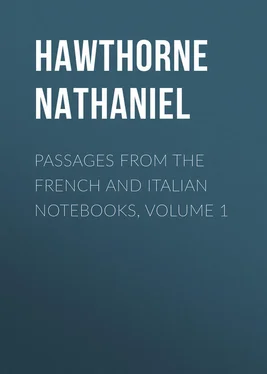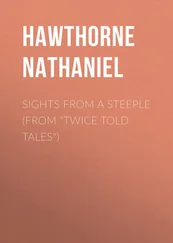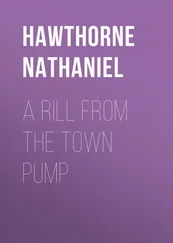Nathaniel Hawthorne - Passages from the French and Italian Notebooks, Volume 1
Здесь есть возможность читать онлайн «Nathaniel Hawthorne - Passages from the French and Italian Notebooks, Volume 1» — ознакомительный отрывок электронной книги совершенно бесплатно, а после прочтения отрывка купить полную версию. В некоторых случаях можно слушать аудио, скачать через торрент в формате fb2 и присутствует краткое содержание. Жанр: literature_19, foreign_antique, foreign_prose, на английском языке. Описание произведения, (предисловие) а так же отзывы посетителей доступны на портале библиотеки ЛибКат.
- Название:Passages from the French and Italian Notebooks, Volume 1
- Автор:
- Жанр:
- Год:неизвестен
- ISBN:нет данных
- Рейтинг книги:3 / 5. Голосов: 1
-
Избранное:Добавить в избранное
- Отзывы:
-
Ваша оценка:
- 60
- 1
- 2
- 3
- 4
- 5
Passages from the French and Italian Notebooks, Volume 1: краткое содержание, описание и аннотация
Предлагаем к чтению аннотацию, описание, краткое содержание или предисловие (зависит от того, что написал сам автор книги «Passages from the French and Italian Notebooks, Volume 1»). Если вы не нашли необходимую информацию о книге — напишите в комментариях, мы постараемся отыскать её.
Passages from the French and Italian Notebooks, Volume 1 — читать онлайн ознакомительный отрывок
Ниже представлен текст книги, разбитый по страницам. Система сохранения места последней прочитанной страницы, позволяет с удобством читать онлайн бесплатно книгу «Passages from the French and Italian Notebooks, Volume 1», без необходимости каждый раз заново искать на чём Вы остановились. Поставьте закладку, и сможете в любой момент перейти на страницу, на которой закончили чтение.
Интервал:
Закладка:
After ascending to the proper level, we were conducted along a corridor, paved with octagonal earthen tiles; on one side were windows, looking into the courtyard, on the other doors opening into the sleeping-chambers. The corridor was of immense length, and seemed still to lengthen itself before us, as the glimmer of our conductor's candle went farther and farther into the obscurity. Our own chamber was at a vast distance along this passage; those of the rest of the party were on the hither side; but all this immense suite of rooms appeared to communicate by doors from one to another, like the chambers through which the reader wanders at midnight, in Mrs. Radcliffe's romances. And they were really splendid rooms, though of an old fashion, lofty, spacious, with floors of oak or other wood, inlaid in squares and crosses, and waxed till they were slippery, but without carpets. Our own sleeping-room had a deep fireplace, in which we ordered a fire, and asked if there were not some saloon already warmed, where we could get a cup of tea.
Hereupon the waiter led us back along the endless corridor, and down the old stone staircases, and out into the quadrangle, and journeyed with us along an exterior arcade, and finally threw open the door of the salle a manger, which proved to be a room of lofty height, with a vaulted roof, a stone floor, and interior spaciousness sufficient for a baronial hall, the whole bearing the same aspect of times gone by, that characterized the rest of the house. There were two or three tables covered with white cloth, and we sat down at one of them and had our tea. Finally we wended back to our sleeping-rooms, – a considerable journey, so endless seemed the ancient hotel. I should like to know its history.
The fire made our great chamber look comfortable, and the fireplace threw out the heat better than the little square hole over which we cowered in our saloon at the Hotel de Louvre..
In the morning we began our preparations for starting at ten. Issuing into the corridor, I found a soldier of the line, pacing to and fro there as sentinel. Another was posted in another corridor, into which I wandered by mistake; another stood in the inner court-yard, and another at the porte-cochere. They were not there the night before, and I know not whence nor why they came, unless that some officer of rank may have taken up his quarters at the hotel. Miss M – says she heard at Paris, that a considerable number of troops had recently been drawn together at Lyons, in consequence of symptoms of disaffection that have recently shown themselves here.
Before breakfast I went out to catch a momentary glimpse of the city. The street in which our hotel stands is near a large public square; in the centre is a bronze equestrian statue of Louis XIV.; and the square itself is called the Place de Louis le Grand. I wonder where this statue hid itself while the Revolution was raging in Lyons, and when the guillotine, perhaps, stood on that very spot.
The square was surrounded by stately buildings, but had what seemed to be barracks for soldiers, – at any rate, mean little huts, deforming its ample space; and a soldier was on guard before the statue of Louis le Grand. It was a cold, misty morning, and a fog lay throughout the area, so that I could scarcely see from one side of it to the other.
Returning towards our hotel, I saw that it had an immense front, along which ran, in gigantic letters, its title, —
HOTEL DE PROVENCE ET DES AMBASSADEURS.
The excellence of the hotel lay rather in the faded pomp of its sleeping-rooms, and the vastness of its salle a manger, than in anything very good to eat or drink.
We left it, after a poor breakfast, and went to the railway station. Looking at the mountainous heap of our luggage the night before, we had missed a great carpet-bag; and we now found that Miss M – 's trunk had been substituted for it, and, there being the proper number of packages as registered, it was impossible to convince the officials that anything was wrong. We, of course, began to generalize forthwith, and pronounce the incident to be characteristic of French morality. They love a certain system and external correctness, but do not trouble themselves to be deeply in the right; and Miss M – suggested that there used to be parallel cases in the French Revolution, when, so long as the assigned number were sent out of prison to be guillotined, the jailer did not much care whether they were the persons designated by the tribunal or not. At all events, we could get no satisfaction about the carpet-bag, and shall very probably be compelled to leave Marseilles without it.
This day's ride was through a far more picturesque country than that we saw yesterday. Heights began to rise imminent above our way, with sometimes a ruined castle wall upon them; on our left, the rail-track kept close to the hills; on the other side there was the level bottom of a valley, with heights descending upon it a mile or a few miles away. Farther off we could see blue hills, shouldering high above the intermediate ones, and themselves worthy to be called mountains. These hills arranged themselves in beautiful groups, affording openings between them, and vistas of what lay beyond, and gorges which I suppose held a great deal of romantic scenery. By and by a river made its appearance, flowing swiftly in the same direction that we were travelling, – a beautiful and cleanly river, with white pebbly shores, and itself of a peculiar blue. It rushed along very fast, sometimes whitening over shallow descents, and even in its calmer intervals its surface was all covered with whirls and eddies, indicating that it dashed onward in haste. I do not now know the name of this river, but have set it down as the "arrowy Rhone." It kept us company a long while, and I think we did not part with it as long as daylight remained. I have seldom seen hill-scenery that struck me more than some that we saw to-day, and the old feudal towers and old villages at their feet; and the old churches, with spires shaped just like extinguishers, gave it an interest accumulating from many centuries past.
Still going southward, the vineyards began to border our track, together with what I at first took to be orchards, but soon found were plantations of olive-trees, which grow to a much larger size than I supposed, and look almost exactly like very crabbed and eccentric apple-trees. Neither they nor the vineyards add anything to the picturesqueness of the landscape.
On the whole, I should have been delighted with all this scenery if it had not looked so bleak, barren, brown, and bare; so like the wintry New England before the snow has fallen. It was very cold, too; ice along the borders of streams, even among the vineyards and olives. The houses are of rather a different shape here than, farther northward, their roofs being not nearly so sloping. They are almost invariably covered with white plaster; the farm-houses have their outbuildings in connection with the dwelling, – the whole surrounding three sides of a quadrangle.
We travelled far into the night, swallowed a cold and hasty dinner at Avignon, and reached Marseilles sorely wearied, at about eleven o'clock. We took a cab to the Hotel d'Angleterre (two cabs, to be quite accurate), and find it a very poor place.
To go back a little, as the sun went down, we looked out of the window of our railway carriage, and saw a sky that reminded us of what we used to see day after day in America, and what we have not seen since; and, after sunset, the horizon burned and glowed with rich crimson and orange lustre, looking at once warm and cold. After it grew dark, the stars brightened, and Miss M – from her window pointed out some of the planets to the children, she being as familiar with them as a gardener with his flowers. They were as bright as diamonds.
We had a wretched breakfast, and J – and I then went to the railway station to see about our luggage. On our walk back we went astray, passing by a triumphal arch, erected by the Marseillais, in honor of Louis Napoleon; but we inquired our way of old women and soldiers, who were very kind and courteous, – especially the latter, – and were directed aright. We came to a large, oblong, public place, set with trees, but devoid of grass, like all public places in France. In the middle of it was a bronze statue of an ecclesiastical personage, stretching forth his hands in the attitude of addressing the people or of throwing a benediction over them. It was some archbishop, who had distinguished himself by his humanity and devotedness during the plague of 1720. At the moment of our arrival the piazza was quite thronged with people, who seemed to be talking amongst themselves with considerable earnestness, although without any actual excitement. They were smoking cigars; and we judged that they were only loitering here for the sake of the sunshine, having no fires at home, and nothing to do. Some looked like gentlemen, others like peasants; most of them I should have taken for the lazzaroni of this Southern city, – men with cloth caps, like the classic liberty-cap, or with wide-awake hats. There were one or two women of the lower classes, without bonnets, the elder ones with white caps, the younger bareheaded. I have hardly seen a lady in Marseilles; and I suspect, it being a commercial city, and dirty to the last degree, ill-built, narrow-streeted, and sometimes pestilential, there are few or no families of gentility resident here.
Читать дальшеИнтервал:
Закладка:
Похожие книги на «Passages from the French and Italian Notebooks, Volume 1»
Представляем Вашему вниманию похожие книги на «Passages from the French and Italian Notebooks, Volume 1» списком для выбора. Мы отобрали схожую по названию и смыслу литературу в надежде предоставить читателям больше вариантов отыскать новые, интересные, ещё непрочитанные произведения.
Обсуждение, отзывы о книге «Passages from the French and Italian Notebooks, Volume 1» и просто собственные мнения читателей. Оставьте ваши комментарии, напишите, что Вы думаете о произведении, его смысле или главных героях. Укажите что конкретно понравилось, а что нет, и почему Вы так считаете.












